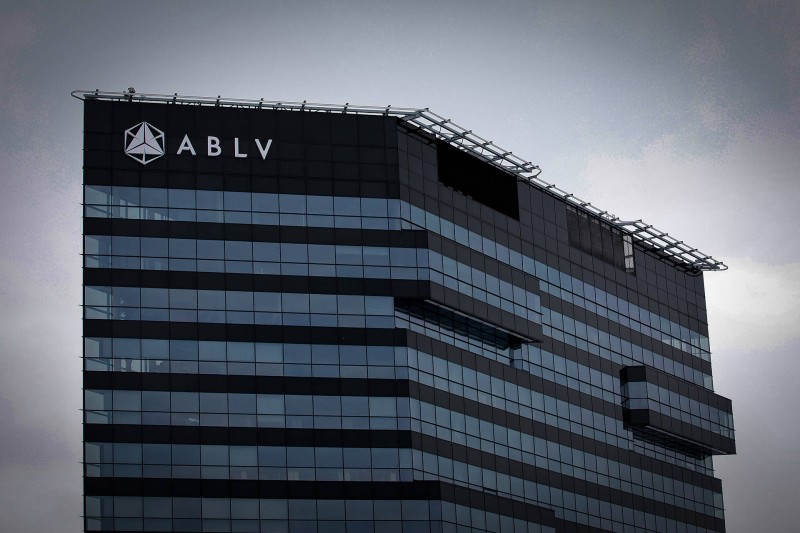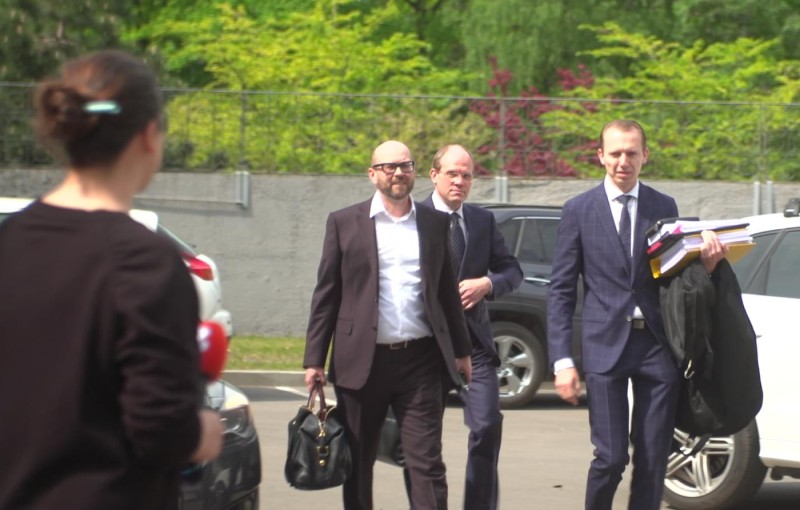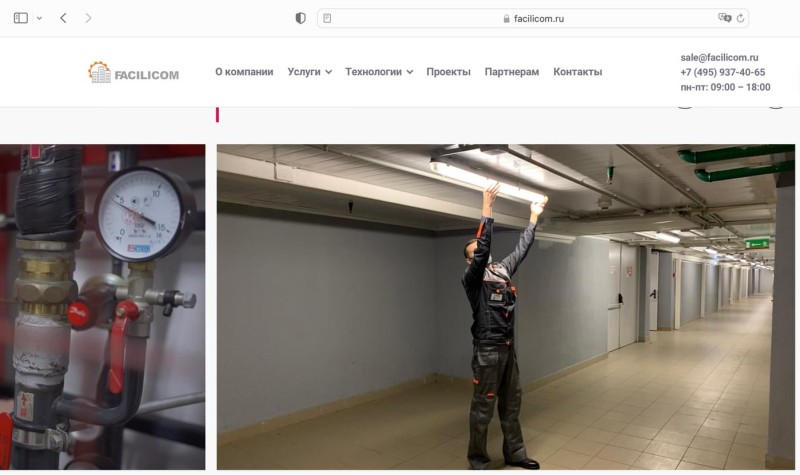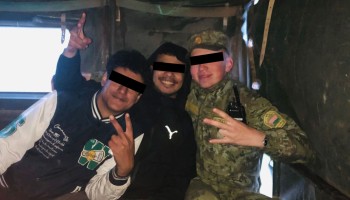In the early 1990s, a round-faced young man with a quiet smile set out to make his fortune in the new world of capitalist commerce that was overtaking his native Belarus.
After first trying his hand at a computer business, he went in a different direction at the suggestion of his mother-in-law: cleaning. Starting with the equivalent of just a few hundred dollars in seed funding, he and his wife Elena launched a small dry cleaning operation in 1994.
“It started as an experiment that didn't carry much weight, but as often happens, the endeavor grew along the way,” Eduard Apsit would later tell an interviewer.
He was being modest. The business grew to become one of the biggest facilities management and cleaning services in the region, and Apsit became a wealthy man, with a stately home in the luxurious Latvian beachfront neighborhood of Jurmala, property in Cyprus, and tens of millions of euros in the bank.
Best known under the brand name Clean World, his business landed impressive clients, including Belarus’s National Library and main railway. In the late 1990s, it expanded to Russia and Ukraine and won even bigger contracts: Russia’s Supreme Court, Central Bank, and even the Kremlin’s concert hall.
But according to court documents unearthed by OCCRP partner Re:Baltica, Latvian financial investigators have frozen some 40 million euros ($42.8 million) they suspect Apsit of laundering through ABLV bank, which was one of Latvia’s largest lenders until it was shut down in 2018 for large-scale money laundering. Investigators froze another 33 million belonging to a Ukrainian man investigators believe is Apsit’s proxy.
Apsit came to investigators’ attention while they were digging into ABLV’s finances. They noticed that millions of euros belonging to him had been moved as loans among many different offshore companies, “without economic logic,” in an effort to obscure their origins.
Their investigation led them to conclude that, starting in around 2013, ABLV created a purpose-built money laundering scheme — known as a “laundromat” — for his benefit.
Apsit has not been charged with any crime, but prosecutors have the option of pressing charges against him or others later as their larger investigation into his alleged money-laundering scheme progresses.
In Latvia, money suspected of having been laundered can be frozen without any predicate crime being established.
In response to questions about the case, Apsit’s lawyer said he had never been the subject of any criminal case in Russia, Belarus, or Latvia. He declined to comment on the Latvian asset freeze since it was still under judicial review.
Eduard Apsit (left) attends a court hearing in Riga, Latvia in mid-May 2023.
From publicly available sources, Latvian investigators learned that in Russia in 2014, one of his companies had been accused of illegally employing migrants from Uzbekistan under slave-like conditions. And five years later, a director of the Belarusian cleaning company owned by Apsit’s wife was caught up in a bribery investigation for allegedly offering $2,500 to an official at a Russian state-owned bank to win a cleaning contract.
But neither Russia nor Belarus has fully cooperated with Latvian authorities’ attempts to learn more about Facilicom, Clean World, or Apsit, making it difficult to continue investigating the origin of his millions.
While Latvian investigators have struggled to learn more about Apsit, journalists from Re:Baltica, IStories, the Belarusian Investigative Center, and Slidstvo.Info have managed to learn more about how his business worked by poring over procurement contracts in Russia, Belarus, and Ukraine.
They found that Apsit’s holding company Facilicom had spawned dozens of other companies in the three countries, either direct subsidiaries or subcontractors that were allowed to use the Clean World brand name. These companies won state cleaning tenders worth at least 120 million euros ($128 million) in Russia and over 40 million euros ($42.7 million) in Belarus, as well as at least 7.5 million euros ($8 million) in Ukraine. In many cases, they did it by bidding against each other for the contracts.
Under Latvian law, the 73 million euros belonging to Apsit and his alleged proxy, a Ukrainian citizen named Sergei Semeniuk, can still be confiscated as alleged proceeds of crime if he cannot prove that they were legally obtained. Although he is fighting their seizure in court, he has not yet been able to explain to investigators how he earned so much money, according to court documents obtained by Re:Baltica and OCCRP.

Riga, the capital of Latvia, where ABLV was headquartered.
Riga, the capital of Latvia, where ABLV was headquartered.
When Latvian investigators queried him about the large sums entering the accounts of one of his offshore companies, which had received payments from a number of other offshores, he said he couldn’t explain them because the companies were supervised by one of his business partners. He said “most likely” those funds had a legal origin, but he could not say more as these transactions were under the supervision of a business partner who was responsible for subcontractors.
“[The case you describe] doesn’t surprise me,” said Tom Keatinge, director of London-based Centre for Financial Crime and Security Studies. “It is consistent with the reputation ABLV has developed.”
“ABLV bank is an unfortunate case for Latvia,” he added. “It was facilitating the entry of criminal money into the international financial system ... As a result, it affected not only the Latvian but the global financial economy, too.”
The Bank that “Institutionalized Money Laundering”
Procurement — the Clean World Way
By 2011, Apsit was successful enough to be featured in a lengthy interview on a Moscow radio station. His hosts were impressed with the scope of his business — “Eduard is like a little republic!” one exclaimed about his thousands of employees — and questioned him for nearly an hour about how he achieved his success.
Apsit was genial and earnest, using his experience to underscore the challenges of building a modern company in an economy that was still recovering from decades of Communist rule.
“If you compare to a more established economy, in places like the Netherlands or the United States, the middle management is head and shoulders above ours,” he said. “We don’t have any fewer smart people — maybe more! — but we’re in a transition period. A country needs a lot of managers … we don’t have such an army.”
It was a week he spent in the Netherlands, Apsit said, that had really opened his eyes to what was possible. Taking advantage of a European program that sought to help former Soviet countries build market economies, he learned from a Dutch entrepreneur how a modern business works from the inside.
“When you open a little window [to the West], you see how it can be in Russia in five to ten years,” he said.
But what reporters found when they looked into Apsit’s practice of pitting his own companies against each other had little to do with modern management techniques.
In one case in Ukraine, two different companies co-owned by Apsit, one called Clean World Trade and one called German Washing Equipment, bid on the same 2016 tender to supply a 4,500-euro washing machine to Ukraine Railways. When the scheme came to light the following year, Apsit was fined 2,000 euros by the Ukrainian anti-monopoly service. (The companies blamed mistakes by staff.)
Companies linked to Apsit won at least nine tenders worth a total of around 755,000 euros in Belarus in a similar manner. In each case uncovered by reporters, the only bidders were Facilicom and Clean World Plus, which are both owned by Elena Apsit. (Belarusian government tenders are required to have at least two bidders, but there is no law prohibiting these bidders from being affiliated, although experts have criticized the practice: “It’s like a competition between the left and right pockets of my pants,” said Uladzimir Kavalkin of opentenders.by, which advocates for more transparency around procurement processes.)
But it was in Russia where Apsit’s company did most of its business.
Starting in the early 2000s, his holding company, Facilicom, began issuing licenses to other companies around the country to use its trademark. Many of these companies then bid against each other to win tenders from state institutions, including the Ministry of Defense, creating the illusion of competition. In total, journalists found this group of companies won around 600 tenders worth around 120 million euros, according to current exchange rates (around $128 million).
The website for Apsit’s holding company, Facilicom.
Although many of these companies used the name “Clean World” or variations on the English word “clean,” like “Cleanup” and “Cleaning Progress,” neither Apsit nor his wife appeared in their ownership structures. However, they had multiple staff and directors in common, and some of the companies also appeared to use Facilicom email addresses or phone numbers.
After Russia annexed Crimea in 2014, the country’s Defense Ministry opened bidding on seven tenders worth 49 million euros (around $58 million at the time) to clean the barracks now occupied by the Russian Army and the Black Sea Fleet on the peninsula.
All seven were won by a single company licensed by Facilicom, Flagman Clean, whose director and shareholder, Galina Sirotinina, was a former employee of two other companies created by Apsit. A contact email address for Flagman Clean listed in one of the procurement documents was for an employee of Facilicom. (Three tenders were later terminated because cleaning was no longer needed, meaning that Flagman Clean would have earned around 27.4 million euros in the end.)
But when an IStories journalist looked back at the bidders for these seven tenders, it became clear that most of the participants were connected to each other: They were either companies operating under a license from Facilicom, or their employees or owners had worked for companies that used the brand. For example, two of the losing companies in the Crimean bids, Constructor of Cleanliness and Active Reserve, were also Facilicom licensees.
A Link to ‘Putin’s Chef’
While analyzing the tenders won by these companies, reporters also discovered an intriguing link to a major Russian procurement fraud scandal. In 2017, anti-corruption activist and opposition politician Alexei Navalny uncovered what he described as a massive “cartel” that had been earning hundreds of millions of euros from Russian Defense Ministry contracts.
Orchestrated by Yevgeny Prigozhin — who had won so many government catering contracts that he became known as “Putin’s chef” — this cartel consisted of multiple interrelated companies, some of which were created “on the fly” to bid for specific defense contracts.
Later, Russia’s anti-monopoly agency confirmed Navalny’s findings and said it had also uncovered three other linked companies that were submitting fraudulent bids to provide housing and sanitary services for military camps: Millennium Clean, White Bear, and Coralclean.
The agency never publicly revealed who was behind these companies, but they were fined 360,000 euros for their anticompetitive behavior.
Now, journalists have found that all three were owned by people with ties to companies in Apsit’s orbit. They weren’t explicitly licensed by Facilicom, but five of their managers and shareholders had been involved in Facilicom-licensed firms.
Millennium Clean and White Bear were also bidders in the tenders to clean the Crimean barracks.
All three companies have now been shut down and reporters could only reach the former owner of one of them, Coralclean.
The ex-owner, Ludmila Chokoraya, was also previously the head of a cleaning company that had operated under the Clean World trademark. Chokoraya confirmed that she had worked for companies in the Facilicom group, but said she knew nothing about a cartel.
“We each had our own duties, our own functions, and I had nothing to do with such events. I can't explain anything about this,” said Chokoraya by phone.
Through his lawyer, Apsit told reporters that none of his companies had received money from the Russian Ministry of Defense and he had nothing to do with the operation run by Prigozhin.
A Ukrainian Proxy?
Latvian investigators have also opened an asset seizure case related to a Ukrainian man they believe was acting as Apsit’s proxy.
Serhiy Semeniuk — whose funds have also been frozen by authorities — had around 33 million euros in ABLV accounts held by offshore companies, including one called Wondermax Sales Inc.
But Latvian authorities believe that this group of companies, which they refer to as the Wondermax holding, was really controlled by Apsit, who also appears to have transferred many of his Russian business interests to Semeniuk after Russia’s 2014 invasion of the Crimean peninsula.
After the invasion, new legislation discouraged Ukrainian state enterprises from doing business with Russian people or companies involved in any aspect of the annexation. However, during this period Facilicom-affiliated companies were bidding on — and winning — cleaning contracts in occupied Crimea.
“Any economic activity of any persons in the occupied territories is recognized as illegal according to the laws of Ukraine,” the Latvian investigators wrote, noting that Apsit and Semeniuk only began moving money through ABLV in suspicious ways after the invasion in 2014.
They suggested the two men may have done this to obscure the origin of funds earned by companies in the Facilicom network that were making money from Russian government contracts, especially in occupied Crimea.
“It is highly probable that after the occupation of Crimea the business was expanded and a new holding infrastructure was created in the interest of Eduard Apsit,” Latvian investigators concluded. “Likely de jure it was transferred to Sergei Semeniuk, but de facto it was controlled and managed by Eduard Apsit.”
Like Apsit, Semeniuk is not himself accused of committing a crime. He told Ukrainian police — who interviewed him on behalf of the Latvian investigators — that he had purchased Apsit’s Russian businesses from him for 93 million dollars, but the Latvian investigators concluded that there was no evidence he ever actually made the payments. Investigators also pointed to indirect evidence that the two men were financially intertwined, including that Semeniuk had managed Clean World in Ukraine, and that Apsit used payment and credit cards from Wondermax Sales Inc. for his own personal use.
In response to questions from journalists, Semeniuk said he was an old acquaintance of Apsit’s who purchased some of his cleaning companies in the 2000s as a business proposition, not because he is a proxy.
He accused Latvian investigators of freezing his funds without any evidence. “The investigation in the case of my companies has a pile of conjectures and fantasies in which they are trying to justify their main mistake: They confused cleaning with laundering.”
“This is, of course, a joke, but the only thing the investigation is interested in is taking away my money. They don’t give a damn about Crimea, Ukraine, and even money laundering — if it even existed.”
Apsit, too, is engaged in a legal battle to regain his frozen wealth. Before a closed-door hearing in May, OCCRP reporters approached him and his lawyer, Ilia Merkouchev, outside a Riga courtroom and asked for comment.
“No black money exists — it is a fiction,” Merkouchev said, blaming the Latvian justice system for adopting “Soviet-style legal mechanisms that have been twisted by implementers — investigators, prosecutors, and judges.”
He said there would be no comment about the cleaning business. Beside him, a silent Apsit kept his eyes glued to his phone.








